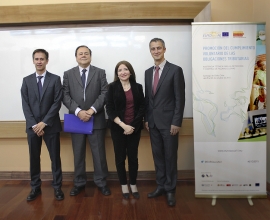EUROsociAL supports Chile's Internal Revenue Service in the detection and control of tax-avoidance strategies
The assistance will contribute to the development and implementation of the General Anti-Avoidance Rule recently approved in Chile
Within the framework of the Voluntary Compliance with Tax Obligations working line of the EUROsociAL II Programme, financed by the European Union, there was a technical assistance mission to the Internal Revenue Service (SII) of Chile from 20th to 23rd October 2015 regarding interpretation and application of the new anti-abuse regulations in the Tax Code, as well as for transferring best practices in detection of actions and contracts for the purpose of tax avoidance.
One of the objectives of Chile's tax reform of last year (approved by Law No. 20,780) is prevention and control of improper tax benefits obtained by taxpayers who use schemes oriented towards avoiding tax compliance, something that impacts tax collection and deprives the State of the resources it needs to finance its social policies.
The Tax Code was reformed in this regard to incorporate the General Anti-Tax Avoidance Rule (GAAR), which entered into force on 30th September 2015. This new regulation is aligned with efforts by the OECD member countries to combat tax avoidance through the “Base Erosion and Profit Shifting Action Plan”, known as the BEPS Project.
With the aim of advising the SII on administrative and legal interpretation and application of the new GAAR, as well as to transfer best practices in the detection of actions and contracts for avoidance purposes, an expert advisory mission was carried out in October by European experts: Carlos Serrano Palacio, of the National Office of International Taxation of the Spanish State Tax Administration Agency (AEAT), and Laurent Amalric, of the French Directorate-General of Public Finance.
The activity consisted of a series of working sessions with representatives of the SII (Central Services, Large Taxpayers, and Regional Heads) to conduct an analysis of the regulations of the three countries (Chile, Spain, and France) and the latest trends in the international area, particularly the BEPS Project and European Union initiatives.
The incorporation of these anti-avoidance measures represents an important step not only for ensuring taxpayer compliance with tax obligations but also for situating Chile in line with comparable legislation on the subject. In this sense, the EUROsociAL technical assistance will contribute to developing the recently approved rule, as it will enable the Chilean administration to adopt implementation measures which can later be made concrete in instructions and circulars.
This activity is part of the Voluntary Compliance With Tax Obligations action of the Public Finance area of the EUROsociAL II Programme, which is coordinated by FIIAPP, in which Spain's State Tax Administration Agency (AEAT) and the Inter-American Centre for Tax Administrations (CIAT) are acting as operational partners.
FIIAPP/AEAT/CIAT

